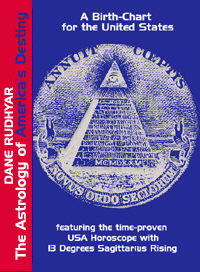 |
| Home | Bio | Art | Music | Literature | Civilization & Culture | Philosophy of Wholeness | Theosophy & Spirituality | Astrology |

THE ASTROLOGY
OF AMERICA'S DESTINY A Birth-Chart for the USA by Dane Rudhyar, 1974 THE ASTROLOGY OF AMERICA'S DESTINY Table of Contents
1. The Birth of the United States
as a Collective Person 2. The Roots of the American Nation 3. America's Place in the Cosmic Process 4. A Birth Chart for the United States of America 5. Two Hundred Years of Growth Through Crisis 6. A Chart for the Beginning of the Federal Government 7. America at the Crossroads Page 1 Page 2 Page 3 Page 4 Page 5 Page 6 Page 7 Page 8 8. Prospects for the Last Quarter Century Illustrations • George Washington receiving the horoscope of America from the Angel Gabriel • The Reverse Side of the Great Seal of the United States • A Chart for the United States of America • A Chart for the Beginning of the Federal Government • A Chart for Richard M. Nixon • A Chart for the Twentieth Century |

CHAPTER SEVEN:
America at the Crossroads - 1 Oftimes great changes in the deeper layers of the collective mind of a nation, of a culture and even of humanity begin to surface in a way that seems to most people to be an expression of a passing emotional upheaval and an escape from the solid realities of the day. When, their minds still glorying in the achievements of the Augustan Age and the proud sense of being masters of the Mediterranean, the Roman aristocracy of the first century A.D. heard that small bands of people of no consequence gathered to worship in an atmosphere of devotion and ecstatic love a crucified rabble-rouser from Palestine who had spread revolutionary ideas, they undoubtedly laughed at or deplored the folly of which even good Roman citizens had become capable. If at that time there had been official psychologists, they probably would have explained the spread of the Christian communities as the price of an extension of the Roman Empire which was introducing strange Eastern cults to low-class citizens and arousing the frustrated emotions of the bored wives of respectable senators and very busy administrators. Obviously, they would have said, the craze would not last and the empire would pursue its magnificent task of bringing law and order to the world, and a solid peace — Pax Romana. If we look at more recent times, since Columbus landed on American soil, we can interpret the European Renaissance as a movement of reaction against the great Age of Faith that had built magnificent cathedrals and unified Europe, but at the cost of spiritual bondage to the dogmatic, all-powerful Roman Catholic Church. Soon enough the rather chaotic and individualistic era of the Renaissance settled down and crystallized into the Classical period of the seventeenth century, which was dominated not only by autocratic rulers glorified as kings by divine right, but also by a rising rationalism and empiricism whose intellectually voracious products were to be modern science and industrial technology. Another movement of reaction, or of psychological compensation, took the form of Romanticism in the nineteenth century. The youth rebelled against what they intuitively felt was the domination of a dull and Puritan bourgeois way of life extolling the rationalistic scientific and economic materialism that was being fostered by the triumph of science and industry. The recent youth movements which either started or spread widely in the sixties, particularly since 1965, might be considered as ephemeral as the Renaissance and the Romantic movement, were it not that something far more important and revolutionary has been developing during the last ten years — something which parallels the basic transformation of the old Roman Empire by the sweep of Christianity. Christianity triumphed, even though in its triumph it absorbed, and later reproduced in its own way, much of what bad been glorified by the empire whose vitality it had sapped and whose gods it had scorned. By permission of Leyla Rudhyar Hill Copyright © 1974 by Dane Rudhyar and Copyright © 2001 by Leyla Rudhyar Hill All Rights Reserved.  Web design and all data, text and graphics appearing on this site are protected by US and International Copyright and are not to be reproduced, distributed, circulated, offered for sale, or given away, in any form, by any means, electronic or conventional. See Notices for full copyright statement and conditions of use. Web design copyright © 2000-2004 by Michael R. Meyer. All Rights Reserved. |
 |